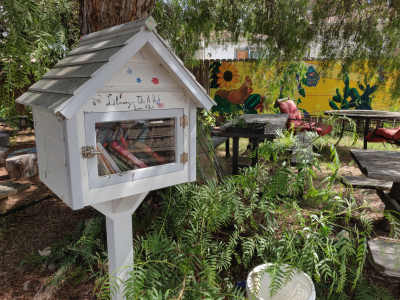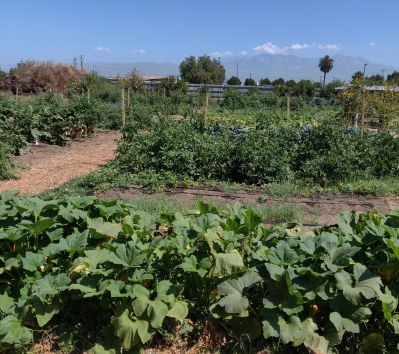Office of Public Affairs
For Immediate Release: December 1, 2020
News Release #2020-12
Media Contact: opa@calrecycle.ca.gov
$1.35 million will support local projects that fight climate change
SACRAMENTO–California communities burdened by pollution and its health impacts can increase access to locally-produced food and air-cleansing green spaces with $1.35 million in Cap-and-Trade Funds.
Community projects eligible for funding will offset climate impacts by enhancing small-scale neighborhood gardens, urban farms and other public spaces through community composting thanks to a first of its kind Community Composting for Green Spaces Grant Program available from the California Department of Resources Recycling and Recovery (CalRecycle).
“These projects fight climate change in two ways,” acting CalRecycle Director Ken DaRosa said. “Helping communities divert green waste lowers climate pollutants emitted from landfills and creates richer soil that can pull more carbon from the air.”

Lusher green spaces unite neighborhoods with a common goal to fight climate change.
“Neighborhoods come together to fight climate change, helping gardens and natural spaces blossom with lusher plant life and trees that thrive thanks to well-tended compost projects,” CalRecycle Environmental Scientist Heather Williams said. “Neighbors tell us they gain a sense of connection and purpose from participating in these projects.”
The California Alliance for Community Composting (CACC), in collaboration with the People, Food, and Land Foundation (PFL), will disseminate funds awarded to them by CalRecycle to launch a network of community compost sites in six regions. December 15, 2020 is the final deadline to submit grant project applications.
The composting grants fund projects that collect compostable food and green waste from the community, then boost natural green spaces with trees and plants that improve air quality and community food gardens. This funding is expected to:
- Support up to 50 community composting projects.
- Create 25 to 30 local, green jobs.
- Provide job training, community outreach and education to residents of underserved, low income, and social/environmental justice communities.

Compost in Green Spaces Fights Climate Change
Compost can help turn depleted dirt into nutrient rich, healthy soil that holds more water and helps pull more carbon out of the atmosphere. Plants grown in compost-amended soil are typically larger, stronger, and produce more crops. Compost projects save kitchen scraps and yard trimmings from emitting pollution when breaking down in a landfill. Instead, greens are returned to the soil to grow the next cycle of life.
 CalRecycle’s Community Composting for Green Spaces Grant Program is part of the California Climate Investments, a statewide initiative that uses billions of Cap-and-Trade dollars to reduce greenhouse gas emissions, strengthening the economy and improving public health and the environment—prioritizing underserved communities
CalRecycle’s Community Composting for Green Spaces Grant Program is part of the California Climate Investments, a statewide initiative that uses billions of Cap-and-Trade dollars to reduce greenhouse gas emissions, strengthening the economy and improving public health and the environment—prioritizing underserved communities
Join CalRecycle’s Community Composting Grant listserv and Environmental Justice listserv for program updates and funding opportunities.
 At a Glance: Soon community food and yard waste recycling will start statewide
At a Glance: Soon community food and yard waste recycling will start statewide
California’s Short-Lived Climate Pollutant Reduction Law (SB 1383) builds upon the state’s commitment to lower pollution and climate emissions, improve health, and create local green jobs.
Starting in 2022, California cities and counties must collect food and yard waste, paper, and cardboard from all residents and businesses, turning it into compost and other green products like biofuel and electricity.
Statewide benefits:
- Reduced pollution and greenhouse gas emissions = to almost 2 million less cars
- Projected to yield $860 million to $2.4 billion in avoided climate impacts, including reduced wildfire risks and avoided relocations of coastal infrastructure.
- About $10.4 billion projected savings in health care and mortality costs.
- Reduced need for chemical pesticides and fertilizers while increasing crop yield by turning depleted dirt back into nutrient rich, water retaining, productive soil.
For more information contact, the Office of Public Affairs, opa@calrecycle.ca.gov

Home Page | News Releases | Public Meetings | Event Calendar | Videos | Publications | Organics | Bottles and Cans
CalRecycle's mission is to protect California's environment and climate for the health and prosperity of future generations through the reduction, reuse and recycling of California resources, environmental education, disaster recovery, and the transition from a disposable to a fully circular economy.
